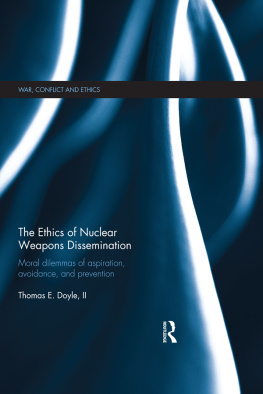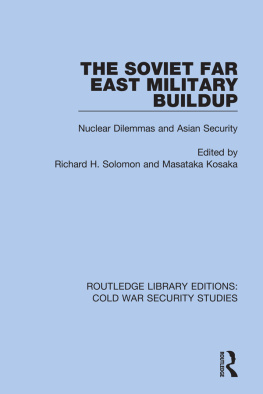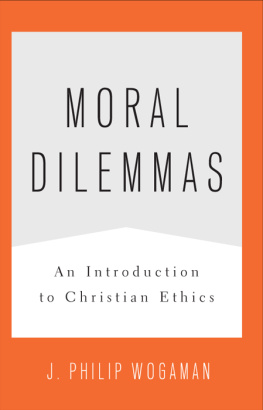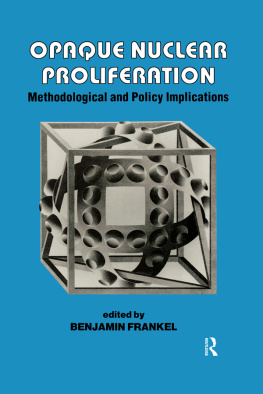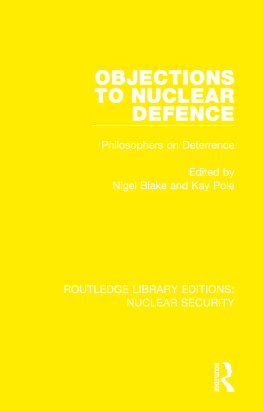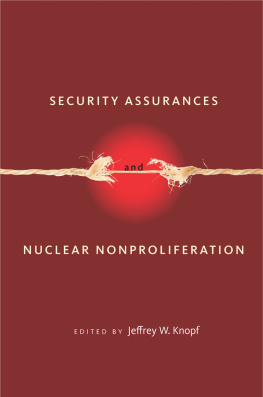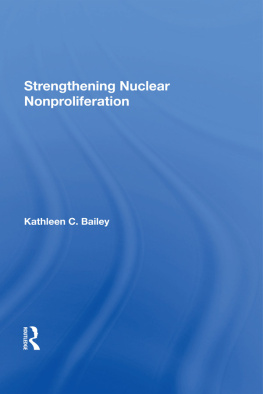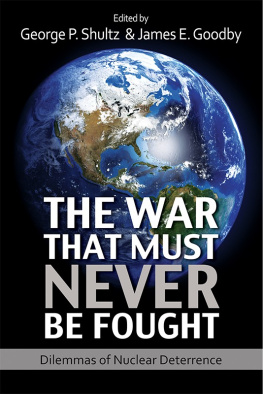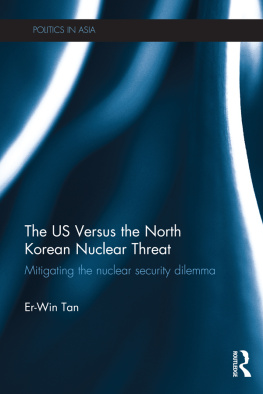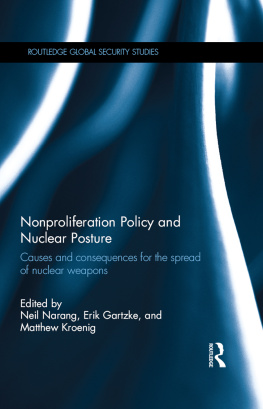The Ethics of Nuclear Weapons Dissemination
This book examines the moral dilemmas of nuclear dissemination, and the justifications of both nuclear pursuit and avoidance by contemporary states.
Applying Constructivist methodologies and moral theory, the author analyzes a core set of moral dilemmas that ensnare decision-makers amongst state and non- state nuclear aspirants, as well as amongst states committed to preventing horizontal proliferation. The book shows that the character, structure, and implications of these dilemmas have not yet been adequately understood or appreciated, and that such an understanding is necessary for an effective set of nonproliferation policies. Furthermore, it shows that the dilemmas force and political policy import are evident in the discourses that diverse actors undertake to defend their nuclear choices, and how the dilemmas of nuclear aspirants are implicated in those of nuclear preventers. The author advocates a number of policy recommendations that reinforce some already made by scholars and experts but, more importantly, others that advise significantly different courses of action. The book reveals how the moral dilemmas of nuclear aspiration, avoidance, and prevention constitute the security dilemmas and paradoxes that comprise much of the twenty-first century security environment.
This book will be of much interest to students of nuclear proliferation, international relations, ethics, and international security studies.
Thomas E. Doyle, II, is Assistant Professor of Political Science at the Texas State University, USA. He has a PhD in Political Science from the University of California Irvine (2010).
War, Conflict and Ethics
Series Editors:
Michael L. Gross
University of Haifa
and
Daniel Rothbart
George Mason University
This new book series focuses on the morality of decisions by military and political leaders to engage in violence and the normative underpinnings of military strategy and tactics in the prosecution of the war.
Civilians and Modern War
Armed conflict and the ideology of violence
Edited by Daniel Rothbart, Karina Korostelina and Mohammed Cherkaoui
Ethics, Norms and the Narratives of War
Creating and encountering the enemy other
Pamela Creed
Armed Drones and the Ethics of War
Military virtue in a post-heroic age
Christian Enemark
The Ethics of Nuclear Weapons Dissemination
Moral dilemmas of aspiration, avoidance, and prevention
Thomas E. Doyle, II
First published 2015
by Routledge
2 Park Square, Milton Park, Abingdon, Oxon OX14 4RN
and by Routledge
711 Third Avenue, New York, NY 10017
Routledge is an imprint of the Taylor & Francis Group, an informa business
2015 Thomas E. Doyle, II
The right of Thomas E. Doyle, II to be identified as author of this work has been asserted by him in accordance with sections 77 and 78 of the Copyright, Designs and Patents Act 1988.
All rights reserved. No part of this book may be reprinted or reproduced or utilized in any form or by any electronic, mechanical, or other means, now known or hereafter invented, including photocopying and recording, or in any information storage or retrieval system, without permission in writing from the publishers.
Trademark notice: Product or corporate names may be trademarks or registered trademarks, and are used only for identification and explanation without intent to infringe.
British Library Cataloguing-in-Publication Data
A catalogue record for this book is available from the British Library
Library of Congress Cataloging- in-Publication Data
Doyle, Thomas E., II.
The ethics of nuclear weapons dissemination : moral dilemmas of
aspiration, avoidance, and prevention / Thomas E. Doyle, II.
pages cm. (War, conflict and ethics)
Includes bibliographical references and index.
1. Nuclear nonproliferation. 2. Nuclear weaponsMoral and ethical
aspects. 3. Nuclear weaponsGovernment policy. I. Title.
JZ5675.D69 2015
172.422dc23
2014031467
ISBN: 978-0-415-62923-2 (hbk)
ISBN: 978-0-203-10004-2 (ebk)
Typeset in Times New Roman
by Wearset Ltd, Boldon, Tyne and Wear
The original idea for this book emerged when I was a political science graduate student at the University of California, Irvine. Since my undergraduate days, I had been intrigued with the international politics and ethics of nuclear war and deterrence. As a PhD student, Etel Solingen and Pat Morgan encouraged me to research the established nuclear ethics literature, which was largely limited to the Cold War issues of nuclear war and deterrence, and then to apply it to the contemporary questions of nuclear deterrence, proliferation, and nonproliferation. I owe Etel and Pat a large debt of gratitude for this encouragement, and also for their critical feedback on my work as it evolved. I could not have asked for better mentors and advocates. Additionally, I owe thanks to Kevin Olson and Martin Schwab for their critical feedback on the political and moral-theoretic elements of my investigations.
Since this book is a beneficiary of this original period of research, I also owe thanks to the following persons and institutions for providing me with financial and other kinds of support which enabled this book to be written. First, to the University of Californias Institute for Global Conflict and Cooperation (IGCC) and its former Director, Susan Shirk, for awarding me a one-year fellowship in 20072008 related to the National Science Foundation and to the Public Policy and Nuclear Threats Workshop. This fellowship released me from teaching duties and allowed me to conduct much of this original research. Second, to Cecilia Lynch and the UC Irvines Center for Global Peace and Conflict Studies, which awarded me a summer small grant in 2008 for the same purpose. And finally to David Easton, for his generous financial support in the form of summer research assistantships in 2006 and 2007.
I want to thank the Political Science Department at Texas State University for their generous institutional support. In my first year as an Assistant Professor, they reduced my teaching load and thereby afforded me much needed time for the final stages of writing the manuscript. I want to thank in particular my former department chair, Vicki Brittain, for her steadfast support in this regard.
Thanks also are due to the following individuals for commenting on all or part of the current manuscript in its various stages of development: Amy Eckert, Antonio Franceschet, Robert Gorman, Lewis Griffith, John Mark Mattox, Edward Mihalkanin, Benoit Pelopidas, Behnam Taebi, and Wilfred Wan. Thanks to their input, I avoided many mistakes in fact and judgment. I am wholly responsible for any mistakes that remain in the book.
I also owe debts of gratitude and appreciation to many other friends and colleagues who helped me in the course of this books development at venues such as the annual International Studies Association, American Political Science Association, and their affiliated conferences or by means of email correspondence. Included in this list are Anthony Burke, Mario Carranza, Christian Enemark, Sohail Hashmi, Jacques Hymans, Roger Kangas, Kerry Kartchner, Haider Khan, John Kelsay, Anthony Lang, Fr. John Langan, Gautam Mukunda, Martin Senn, Robert E. Williams, and Ward Wilson.
Many thanks are also owed to Michael Gross and Daniel Rothbart, the senior series editors, as well as the rest of the Routledge editorial team: Natalja Mortensen, Hannah Ferguson, and Annabelle Harris. I appreciate the assistance of the copyeditors, and many thanks to the anonymous reviews for their very useful comments on the books preliminary drafts.

